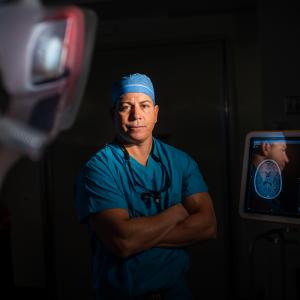
Photo: Henglein and Steets/Getty
NYU Langone Health’s Perlmutter Cancer Center recently launched an initiative to raise awareness of LGBTQ+ issues among staff and healthcare providers at the cancer center. The initiative, developed with practitioners from NYU Langone’s transgender surgery services team, is led by Abraham Chachoua, MD, the Jay and Isabel Fine Professor of Oncology in the Department of Medicine and associate director of cancer services at Perlmutter Cancer Center, along with several others.
The idea for the initiative was sparked, Dr. Chachoua says, by research on LGBTQ+ awareness among healthcare providers conducted by Gwendolyn P. Quinn, PhD, the Livia S. Wan, MD, Professor of Obstetrics and Gynecology in the Department of Obstetrics and Gynecology and professor in the Department of Population Health.
In 2019, Dr. Quinn and her colleagues published a first-of-its-kind study that surveyed 450 oncologists from the 45 National Cancer Institute–designated Comprehensive Cancer Centers in the United States to assess their knowledge, attitudes, behaviors, and willingness to be educated about LGBTQ+ people who have cancer. The study reported that the majority of oncologists were comfortable treating individuals who identify as lesbian, gay, or bisexual, but only half expressed confidence in their knowledge of these patients’ health needs. As a result of their findings, the researchers recommended cancer centers not only create an environment safe for patients to disclose their sexual orientation and gender identity, but also establish protocols for treating LGBTQ+ people with cancer.
“There’s an understanding that there are unique needs in cancer both in treatment and in supportive care and survivorship for the LGBTQ+ population, but slowly growing awareness that every population is unique,” Dr. Quinn says. “It's an openness—what we now call cultural humility—to understanding that medical training and education thus far have been heteronormative.”
“For me, that was a starting point to consider what Perlmutter Cancer Center can do to try and enhance what is already going on at NYU Langone to increase cultural awareness of the LGBTQ+ population,” Dr. Chachoua says.
Dr. Chachoua envisions the initiative tackling three objectives. First, education of the staff and the faculty to make the cancer center a safe place for the LGBTQ+ community to be. Second, establishing screening guidelines for the LGBTQ+ patient population to improve access to early detection of cancer. Third, adding a research component, which could range from assessing the effectiveness of physician training to laboratory research to understand, for example, if the hormones a transgender person receives predisposes cancer development.
Understanding the Issues to Deliver the Best Care
“There are clear relationships and associations between subtypes of cancers and race and ethnicity; it’s time we looked at sexual orientation and gender identity to deliver the very best care to this population,” says Deborah M. Axelrod, MD, the John and Elaine Kanas Family Foundation Clinical Professor of Surgical Oncology in the Department of Surgery and director of clinical breast programs and services at Perlmutter Cancer Center. “Based on sexual orientation and gender identity, healthcare providers can put on their thinking caps to change the mindset of what the issues are, and that includes workup and treatments for various cancers.”
If an oncologist doesn’t know the issues, they can’t ask the questions, Dr. Axelrod says. For example, in Dr. Axelrod’s practice, a transgender man who had been living in Australia at the time of his bilateral mastectomies was told he had precancerous findings. He came to see her to discuss management and follow-up for these findings. In the course of speaking with him, he complained about some vaginal spotting. He has since met with a gynecologist at NYU Langone and had a subsequent hysterectomy and removal of the ovaries.
To assist with the cancer center’s initiative, Dr. Chachoua reached out to Rachel Bluebond-Langner, MD, the Laura and Isaac Perlmutter Associate Professor of Reconstructive Plastic Surgery in the Hansjörg Wyss Department of Plastic Surgery, and Nathan Levitt, MSN, FNP-BC, a family nurse practitioner on the transgender surgery services team, who have been working to enhance LGBTQ+ awareness throughout NYU Langone over the last three years.
“Dr. Chachoua is committed to ensuring that Perlmutter Cancer Center leads the way for LGBTQ+-affirming care,” Dr. Bluebond-Langner says.
Dr. Bluebond-Langner notes that LGBTQ+-affirming care includes offering care that is culturally sensitive to the gender identity and sexual orientation of a person with cancer, using proper pronouns, and avoiding assumptions about who people partner with.
As an initial step, Mr. Levitt and Kevin Moore, RN, a nurse on the transgender surgery services team, went through each floor of the cancer center and asked employees if they had any LGBTQ+ patients, whether they knew where in the electronic medical record system they would find the chosen name or the pronouns people use, and making sure that rooms are not gendered.
Knowing whether a person with cancer has had gender-affirming surgery is especially important for cancer care, Mr. Levitt says, because oncologists need to know what body parts people have and what surgeries they may have had to change those body parts. It is also important to know if a patient is taking hormones in case they have a hormone-dependent cancer.
“I advocate within oncology—and within all care—that we move away from what’s called women’s health or men’s health or women’s cancers or men’s cancers because we might have transgender women who have prostate cancer or transgender men who might have breast or ovarian cancer,” Mr. Levitt says. “It is really important that we de-gender that language.”
Enhancing Cultural Sensitivity at Every Level
Dr. Quinn acknowledges that while the oncologist is the “captain of the ship,” the rest of the team also needs training. She cites examples of LGBTQ+ people who had a negative encounter with the scheduler or with the security desk, and by the time they actually see their oncologist, they were in a bad mood and fearful about how things would go. Therefore, she says, it is important to train the entire hospital. As Perlmutter Cancer Center’s LGBTQ+ initiative takes shape, she envisions playing a role identifying the best training tools and methods for various stakeholder populations in the cancer center.
Before joining NYU Langone in 2018, Dr. Quinn helped develop an online training program for oncologists at Moffitt Cancer Center in Tampa, Florida, called Curriculum for Oncologists on LGBTQ Populations to Optimize Relevance and Skills (COLORS), which she hopes to implement at Perlmutter Cancer Center. COLORS walks oncologists through basic aspects of creating an inclusive practice, such as how to set the tone when in a meeting with LGBTQ+ patients, and provides examples of how things might be different or similar in these various populations.
“For example, typically an oncologist would talk to all adolescents and young adults with a cancer diagnosis about fertility and fertility preservation,” Dr. Quinn says. “They shouldn’t make the assumption that because a person is in a same-sex relationship that they’re not interested in fertility.”

